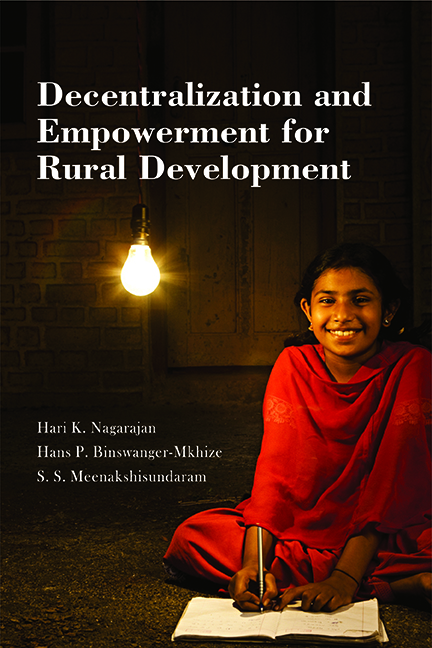Book contents
- Frontmatter
- Contents
- List of Tables and Figures
- Foreword 1
- Foreword 2
- Preface
- 1 Introduction
- 2 Decentralization: Cross-country Experiences
- 3 Thinking about Decentralization in India: 73rd Amendment and Beyond
- 4 Literature
- 5 An Overview of the Data
- 6 Analytical Approaches and Econometric Methods Used
- 7 Can Panchayats Improve the Quality of Services? Some Qualitative Evidence
- 8 Impact of Political Reservations for Women in Panchayats
- 9 Importance of Individual Empowerment of Women
- 10 Governance, Service Provision and Development Outcomes
- 11 The Impact of Fiscal Grants on Tax Efforts of Village Panchayats
- 12 Incidence of Identity-based Voting and Bribes in Panchayats
- 13 Panchayats and Household Vulnerability
- 14 Key Findings, Conclusions and Policy Recommendations
- References
- Index
- About the Authors
8 - Impact of Political Reservations for Women in Panchayats
Published online by Cambridge University Press: 30 November 2022
- Frontmatter
- Contents
- List of Tables and Figures
- Foreword 1
- Foreword 2
- Preface
- 1 Introduction
- 2 Decentralization: Cross-country Experiences
- 3 Thinking about Decentralization in India: 73rd Amendment and Beyond
- 4 Literature
- 5 An Overview of the Data
- 6 Analytical Approaches and Econometric Methods Used
- 7 Can Panchayats Improve the Quality of Services? Some Qualitative Evidence
- 8 Impact of Political Reservations for Women in Panchayats
- 9 Importance of Individual Empowerment of Women
- 10 Governance, Service Provision and Development Outcomes
- 11 The Impact of Fiscal Grants on Tax Efforts of Village Panchayats
- 12 Incidence of Identity-based Voting and Bribes in Panchayats
- 13 Panchayats and Household Vulnerability
- 14 Key Findings, Conclusions and Policy Recommendations
- References
- Index
- About the Authors
Summary
Introduction
The process to allow empowerment in the political sphere, reservations to increase women's political power by reserving a share of seats for women who contest in any election has become popular globally. In fact, nearly 100 countries worldwide are reported to practice gender quotas to overcome gender bias and long-standing inequalities. Still, electoral quotas remain controversial. This is due to the suspicion that the effects of political reservations may at best be temporary, or could affect only a narrow clientele. While supporters of political reservations argue that empowering members of historically disadvantaged groups can result in more inclusive processes of policymaking drawing in those previously excluded. To the extent that such measures improve access to public goods (e.g. education or roads) by those who were earlier excluded or marginalized, political reservations can be viewed as Pareto optimal strategy ensuring better development and use of a society's human potential. Critics note that such measures run a danger of bringing to office individuals who lack necessary qualifications and may then be easily manipulated by traditional elites. In addition to adverse effects, reservations, when they are in force, may also adversely affect behaviour by competitively elected leaders who, because they are prevented from standing for re-election, will have their time horizon truncated and, thus, be tempted to adopt myopic patterns of behaviour that do not maximize long-term social welfare.
This chapter explores the effects of political reservations for women in the Indian panchayats. Chapter 3 has shown that the constitution provides reserving a share of seats by rotation in the panchayats. The qualitative evidence from chapter 5 suggests that in panchayats headed by women there is a greater likelihood that both women and men participate actively in the process of governance. The Mani Shankar Aiyar Committee Report (2013) asserts that political reservations have enabled the participation by nearly a million women in panchayats as functionaries and there is not much evidence of capture of power by elite groups either. Other evidence also points to improved service provision and better functioning gram sabhas. In this chapter, empirical evidence of the development impact of political reservation for women on a range of government processes, outputs and development outcomes have been provided.
- Type
- Chapter
- Information
- Decentralization and Empowerment for Rural Development , pp. 146 - 176Publisher: Foundation BooksPrint publication year: 2014



